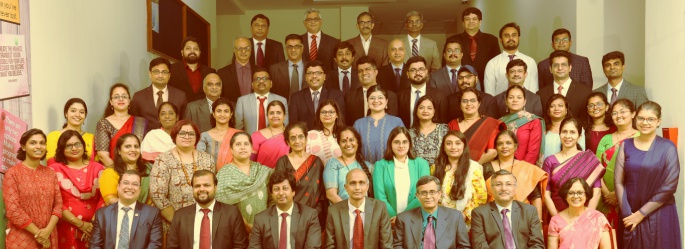Emerging technology trends in management education in India
Publication: Times of India
Author: Prof. Selvaraj Vadivelu
Technological advancements lead to innovations that impact society in a big way. Businesses leverage these advancements to grow profitably by delivering enhanced value to their stakeholders. The education sector is one of those which has been adopting new technologies in a variety of ways. This was accelerated in the last couple of years with the pandemic testing every industry on its ability to cope with the changes that it brought about through the lockdowns and social-distancing norms. While the pandemic may have come under control leading the education institutions to resume normal operations, some of the changes and the associated technologies are here to stay.
Management education has some unique requirements. It involves higher interactivity amongst participants and faculty. Evaluations are effort intensive as they typically involve the assessment of descriptive analysis reports, discussions, role-plays, and presentations. Yet another challenge is catering to the dual objective of ensuring the courses are industry-oriented and are personalized to meet the various career paths of participants.
In this context, it is of interest to try and understand the technology trends we are likely to witness in management education in the immediate future.
Learning
Online learning platforms including specific devices like interactive whiteboards have been used for management education to share content, enable assignment submissions, do objective assessments, and for course delivery. This trend is likely to continue for regular academic programs and executive education programs despite campuses opening due to the flexibility and improved reach. Innovations are likely to continue in this to enable more and more of the executive education programs to be delivered online or at least in hybrid mode.
On the infrastructure front, interactive systems in the classrooms enable hybrid learning catering to the unique requirements of Management education. Collaboration between students for the course and co-curricular activities is critical. Secure and user-friendly collaboration platforms need to be identified and enabled. In addition to this, low-code/no-code technology-based customized applications are likely to be developed by students to meet context-specific requirements. This can give the management students the much-needed consulting mindset to comprehend existing business processes and transform them to address challenges or tap opportunities for improvement. IoT is being used increasingly in a variety of use case scenarios in providing a good campus infrastructure. To name a few use cases: Lighting, Temperature control, Security cameras, Audio Visual systems, Access control, and Attendance automation. While these are common for any educational setup it is particularly interesting in a management education setting as it brings out the focus on the solution approach for efficient, effective, and sustainable systems.
Augmented Reality (AR) applications are finding their way into course projects and presentations for demonstrating product ideas the way it is being used for marketing purposes to give customers an immersive simulation experience. Virtual Reality (VR) applications and devices have been used to develop leadership and soft skills and this is likely to be used more commonly in the immediate future.
Assessments are being increasingly done online so that the participants can take these at their convenience and bring in cost efficiencies through optimization of space and manual evaluation efforts. These tools can identify events that need manual review by the evaluator for identifying malpractices. While plagiarism checks are being done with existing tools, new Artificial Intelligence (AI) tools are likely to be adopted more widely and easily across all submissions by participants.
There are a variety of career paths for a management professional today. Management education, especially in the second year should enable students to customize the course/content to suit their individual preferences in terms of the career paths while maintaining the standardization required across the program. The conventional major/minor specialization approach through electives is not optimal from a flexibility and cost point of view. Towards this, interlinkages between concepts and their applications can be defined for various management courses leading up to these different career paths. Machine Learning (ML) techniques can then be used to build systems to provide module-level recommendations to students to both meet the program requirements as well their career path aspirations.
Blockchain based management systems for student records, certificates and degrees is likely to be used. Smart contracts built on blockchain technology will soon be used to define the course requirements and award credits automatically once the requirements are met by the students.
Administration
As in any organisation, management institutions need business process management software, dashboards with rich visualizations, actionable insights, predictions, and prescriptions. In this regard, the choices made in terms of buy vs customize vs build, which one to buy or how to build are good learning opportunities for management students. The solutions can range from standard off-the-shelf Enterprise Resource Planning (ERP) software to homegrown student lifecycle management systems. Customized low-code/no-code applications for specific requirements are likely to be used increasingly.
In summary, in the next couple of years, management education is likely to see a trend of increased adoption and effective usage of the existing technologies with a few solutions using the new technologies.




